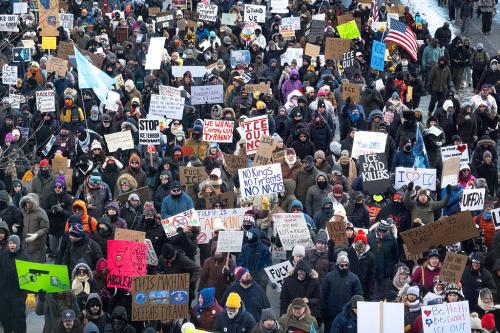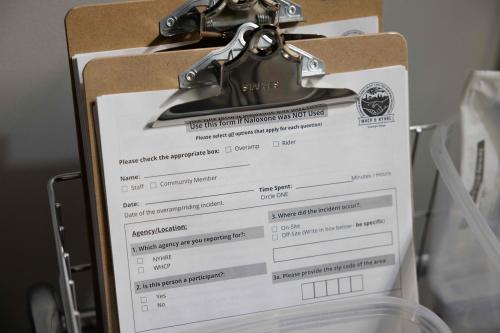President Barack Obama described GOP front-runner Donald Trump as someone “taking advantage” of Americans’ anxieties about the future, particularly those of blue-collar men. Speaking to NPR’s Steve Inskeep in a year-end interview, the president highlighted Americans’ concerns about demographic change and experiences of diminished economic opportunity:
“But I do think that when you combine that demographic change with all the economic stresses that people have been going through because of the financial crisis, because of technology, because of globalization, the fact that wages and incomes have been flat lining for some time, and that particularly blue-collar men have had a lot of trouble in this new economy, where they are no longer getting the same bargain that they got when they were going to a factory and able to support their families on a single paycheck, you combine those things and it means that there is going to be potential anger, frustration, fear. Some of it justified but just misdirected. I think somebody like Mr. Trump is taking advantage of that. That’s what he’s exploiting during the course of his campaign.”
The American Values Survey, a collaboration between the Public Religion Research Institute (PRRI) and the Brookings Institution, substantiates the President’s claims by clarifying the identity and outlook of Trump’s supporters. A majority (55 percent) of Republicans and Republican-leaning independents who support Trump are white working-class Americans. In contrast, only 35% of those supporting other Republican candidates identify as white and working-class.
Trump supporters differ most from those supporting other Republican candidates on issues of immigration. Nearly seven in ten (69 percent) Trump supporters say that immigration is a critical issue to them personally, compared with only 50 percent of those supporting other GOP candidates. Eight in ten Trump supporters say that immigrants today are a burden to the U.S. because they take American jobs, housing and healthcare; just 56 percent of those supporting other Republican candidates say the same. And roughly three quarters (74 percent) of Trump supporters agree that discrimination against white (non-Hispanic) Americans has become as big a problem today as discrimination against blacks and other minorities. This sentiment is shared by only 57 percent of those supporting other Republican candidates.
The PRRI-Brookings Survey also finds that white, working-class anxiety about demographic change is linked to experiences of diminished economic opportunity. Roughly two-thirds (66 percent) of white-working class Americans say illegal immigrants are at least somewhat responsible for America’s current economic conditions, compared to only 44 percent of white college-educated Americans who say the same. Concerns about the U.S. economy span the political and demographic spectrums, but 78 percent of white working-class Americans believe the United States is still in a recession, compared to just 62 percent of white college-educated Americans.
Economic anxiety and demographic resentment combine in unique ways that have a powerful impact on public opinion and ultimately American politics more generally. How are we to understand these sentiments heading into an election year? Writing for the Wall Street Journal, Brookings Senior Fellow William Galston observes that the white working-class revolt against economic and immigration police—from trade treaties and crony capitalism to immigration reform—caught the GOP establishment “flat-footed.” The extent to which the establishment can navigate this sentiment in the New Year remains to be seen.
The Brookings Institution is committed to quality, independence, and impact.
We are supported by a diverse array of funders. In line with our values and policies, each Brookings publication represents the sole views of its author(s).




Commentary
Is Trump “taking advantage” of American anxieties?
January 1, 2016